Toothache
Intense, Throbbing Pain
Toothache is one of those discomforts that can strike at the most inconvenient times. Whether it’s a dull ache or a sharp, throbbing pain, dealing with a toothache can be excruciating.

Toothache: What is it?
It is a painful sensation originating from the teeth or their supporting structures. This distressing discomfort can vary in intensity and is often caused by various dental issues. It typically arises from factors such as dental cavities, infections, gum disease, or dental trauma. The discomfort can be localized or radiate to nearby areas, causing significant discomfort and difficulty in daily activities like eating or even speaking. It is advisable to seek timely professional care to alleviate the pain and address the underlying dental concerns.
Common Causes of Toothache
- Tooth Decay: The most common culprit behind toothaches is tooth decay. When bacteria attack the enamel, it can lead to cavities, causing pain.
- Gum Infections: Gingivitis and periodontitis can result in toothache as they affect the gums and bone supporting the teeth.
- Tooth Sensitivity: Experiencing pain when consuming hot or cold foods can be indicative of tooth sensitivity.
- Cracked or Fractured Teeth: Even a tiny crack in your tooth can lead to a severe toothache.
- Impacted Wisdom Teeth: When wisdom teeth do not erupt properly, they can become impacted, causing pain and discomfort.
- Sinus Infections: Surprisingly, sinus infections can also cause toothache, as the pain radiates from the sinus area.
Symptoms of Toothache
Recognizing the symptoms of a toothache is essential for proper management:
– Persistent, throbbing pain
– Sensitivity to hot and cold temperatures
– Swelling around the affected tooth
– Pain when chewing or biting
– Fever or headache (in severe cases)
How to Relieve a Toothache
Home Remedies
- Saltwater Rinse: Gargling with warm salt water can help reduce inflammation and kill bacteria in the mouth.
- Clove Oil: Applying clove oil directly to the affected area can provide temporary relief due to its natural numbing properties.
- Cold Compress: Placing a cold compress on the cheek outside the affected area can numb the pain.
Over-the-Counter Solutions
- Pain Relievers: Non-prescription pain relievers like ibuprofen can provide temporary relief from toothache pain.
- Topical Anesthetics: OTC gels and ointments containing benzocaine can numb the affected area.
When to Seek Professional Help
While these remedies can provide temporary relief, it’s crucial to consult a dentist for a permanent solution. Dental professionals can perform X-rays, diagnose the root cause, and recommend appropriate treatments, including:
– Dental fillings or crowns
– Root canal therapy
– Extraction
It's Essential to Consult a Dentist
The experience is undoubtedly unpleasant, but with the right knowledge and remedies, you can manage the pain effectively. Remember, while home remedies can provide temporary relief, it’s essential to consult a dentist for a proper diagnosis and treatment plan. By taking proactive steps to address the root cause of your toothache, you can look forward to a future free from dental discomfort.
Frequently Asked Questions - FAQ
A: It may subside temporarily, but it usually indicates an underlying issue that requires professional attention.
A: Maintain good oral hygiene, including regular brushing, flossing, and dental check-ups. Avoid sugary and acidic foods and drinks.
A: Yes, but use it sparingly and consult a dentist.
A: Yes, as the sinuses are closely related to the upper teeth, an infection in the sinuses can cause referred pain.
A: Contact a dentist immediately, as severe toothaches can indicate a dental emergency.
A: Ignoring a toothache can lead to worsening dental problems, including infections, abscesses, and tooth loss.
Payment Options / Plans
Payment plans are essentially loans, which can support you in managing the high cost of dental treatment. Rather than paying for your dental work in an upfront lumpsum, a payment plan allows you to pay in instalments over a period of time. We have onboard, payment plan service providers who will make your payment plan’s instalments even more affordable.
There are several payment options available at our surgery including Cash, Cheque, EFTPOS, Credit Card, HICAPS, AMEX and Direct Deposit.







